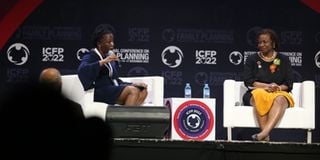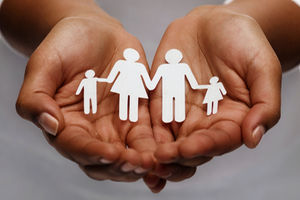Family planning should be all inclusive agenda

Africa Director at the International Centre for Research on Women-Evelyn Opondo (left) speaking during the ongoing International Family Planning Conference in Thailand.
Thailand,
“Everyone deserves the right to determine, as best they can, the course of their own lives. Whether and when to have children, how many, and with whom they want to,” these were Evelyne Opondo`s words.
While moderating a plenary session at the ongoing sixth International Conference on Family Planning in Thailand, the Africa Director at the International Centre for Research on Women (ICRW) said family planning is a human right and that countries should work on ensuring that no one is left behind.
Ms Opondo said that everyone deserves to make informed decisions about whether and when they will carry pregnancies but too often, family planning programs, across many countries in the world, serve the biggest populations and not necessarily the population that has the highest need.
“It is my hope that this conference serves as a source of strength for all of us and that we may protect human rights. Human rights define the quality of life that we both enjoy and the value of the life of each person and their relationship to society,” says Ms Opondo.
Looking at the barriers that prevent some particular populations from accessing sexual reproductive health services, she asked some of the conservative governments to drop the retrogressive laws that prevent women from accessing the services.
She also emphasized the urgency by governments to address the growing number of populations who need the services but have a harder time accessing them because of policy, stigma or affordability.
“Even as we speak about family planning, we do not only use contraceptives for purposes of planning our families but some of us just want to engage in sex just for pleasure and that is okay. We need to ensure that each one of us can access quality family services and information that they need,” she said.
Also read: Kenya, a leader in Africa on family planning
Dr Natalia Kanem, Executive Director of the United Nations Population Fund said that countries need to commit to human-based approaches to ensure that people access quality services without being gauged.
“It is important for countries to adopt a human rights-based approach in family planning. For UNPFA rights and freedom is our slogan and human-based approach to family planning is what women are demanding and what makes sense for governments and for the individuals
“Many often what we see on the paper is not the true picture of what it is in reality, one woman in four is unable to say no to sex and others are unable to make simple decisions and in other countries, there are laws that prevent women from accessing contraception without consent,” she said
She said that human rights should be for choice and quality as well as equality and accountability.
Dr Kanem echoed that UNFPA has committed 1.7 billion dollars to accelerate progress towards rights-based family planning and human rights are at the centre of the program since many populations including adolescents in many countries fail to exercise their rights freely with many having to get consent before getting the services.
In Kenya, for instance, the government has maintained that giving contraceptives to minors is illegal and punishable by a jail term of up to 20 years.
Reproductive health
Matters of adolescents’ sexuality, transition and reproductive health have been a thorny issue, with some county reproductive health coordinators calling for adolescents to be given contraceptives to curb the high number of teenage pregnancies.
One in every four girls in Kenya aged between 10 and 19 is either pregnant or has given birth to a first child, according to the National Council for Population and Development report 2021.
The National Reproductive Health policy 2020/30 does not allow any healthcare worker to give contraceptives to minors unless they are accompanied by a parent or a guardian or get consent from the latter.
“In Philippine countries, women would pay fines if they did not get their appointments on time and this was hindering people from accessing the services and the government decided to change policy and procedures accordingly.
She adds: “Governments have to put women at the centre of development and also make sure that discrimination does not bar women in need. We have to ensure that we are not leaving anyone behind by looking at the rights of those who are mostly pushed behind.”
Ms Latanya Mapp Frett, President and Chief Executive Officer, of Global Fund Women, asked the governments to protect the adolescents who want to be part of the decisions that are made about them.
“We trust those who are in the ground and we should not make policies for them, we should allow them to be part of the decision,” she said
Avali Khare, Queer Rights coordinator, YP Foundation said queer populations are not included in the family planning agenda and that there is a bias in many global organisations and many countries towards them.
In most countries, she said, they are denied the right to access family planning with laws and policies that criminalize them.
“The ability to access rights should not be pegged on people’s gender or sexual orientation and if we are claiming that we do not want to leave no one behind but transgender people are being left behind then we are doing enough,” she said
We should advocate for inclusive policies that speak to the sexual reproductive health of young people and at the same time ensure that our family planning programming is embracing all young people including queer groups.




